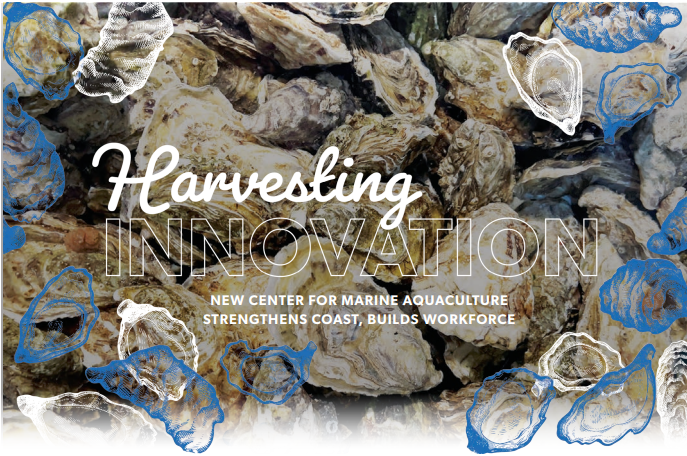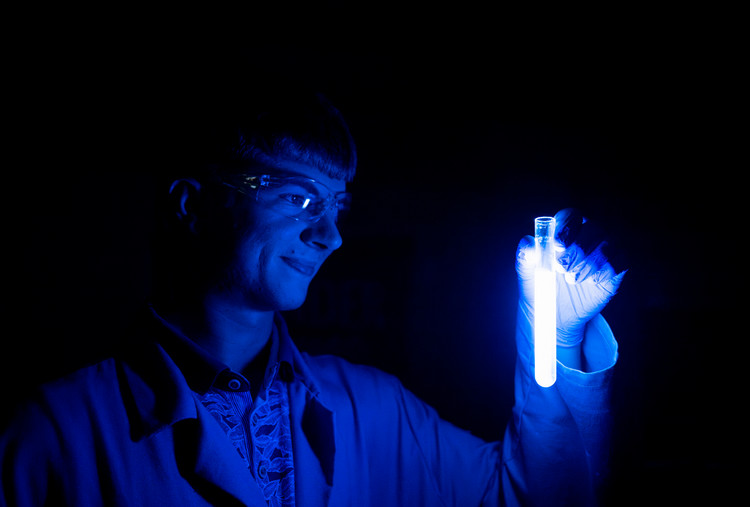Island University Honors Regents Professor at Alumni Shrimp Boil
CORPUS CHRISTI, Texas – Islander alumni, faculty, and staff gathered Oct. 26 at a remote College of Science and Engineering (COSE) research station to celebrate the accomplishments of a Regents Professor and to enjoy a Cajun-style shrimp boil.
During the gathering at the Laguna Madre Field Station, Dr. Paul Montagna, Regents Professor, Physical and Environmental Sciences Department Professor, and Harte Research Institute Endowed Chair for Ecosystems Studies and Modeling at Texas A&M University-Corpus Christi, was noted for his successful work in helping establish the University’s emerging research mission.
“Paul Montagna was the right person at the right time,” said Dr. Frank Pezold, COSE Dean. While Montagna is known as an international researcher with well-funded programs in coastal and benthic systems, Pezold said Montagna was being honored for his many contributions to the development of the college and the University.
Montagna served as program coordinator for the Coastal and Marine Systems Science (CMSS) doctoral program for eight years, which was the first Ph.D. program in the sciences at Texas A&M-Corpus Christi.
“That is immensely significant,” Pezold said. With the University becoming a four-year institution in 1994 and in the early 2000s adding the Harte Research Institute and the CMSS doctoral program, a major transformation was underway. The University began to grow from its primary mission as a teaching-focused institution, modeled in the small liberal arts college tradition, and started to establish the research capacity required to develop successful and competitive science doctoral programs.
“That’s a huge step for the University to make, and when you make a leap like that, it’s very important that you have the right people at the helm helping you to guide that effort,” Pezold said. “Dr. Montagna played a pivotal and critical role in the transformation of our college culture to align with our new mission.”
Even with his extensive research commitments, Montagna served in many college leadership roles. He chaired and served on the College Promotion & Tenure Committee and the College Steering Committee, and has been a member of the College Chairs & Directors Council. He also led the effort to create a master’s in CMSS.
“The CMSS program has been a resounding success,” Pezold said. “Dr. Montagna’s perspective has been highly influential due to his experience, clear thinking and articulation, and his collegial personality. The significance of Dr. Montagna as a mentor and agent of transition in our college’s cultural evolution cannot be overstated.”
Montagna came to A&M-Corpus Christi from The University of Texas Marine Science Institute, where he led the development of the Mission-Aransas National Estuarine Research Reserve. Looking for a new challenge, he was attracted by the opportunity to help build a top research program at the Island University.
“I thought I could help a little bit, and when I arrived, I realized that the doctoral program hadn’t had any leadership yet,” Montagna said. “It’s really been a lot of fun, helping the university grow and being a part of it all. It’s been very rewarding.”
Also recognized at the sixth-annual alumni shrimp boil was Dr. Roy Lehman, the college’s newest emeritus faculty member.
“The Board of Regents for the A&M System awards this status to a faculty member who has shown a career pattern of distinguished service, significant contributions to the System and the University,” Pezold said. “These include contributions in teaching, research, or service that go beyond the normal duties and responsibilities.”
Lehman has been a faculty member for 27 years, had 47 graduate students and was among those who led the efforts to develop the Laguna Madre Field Station, beginning in 1999.
Entertaining at the event with live music was the Antisocial Science Band.































































